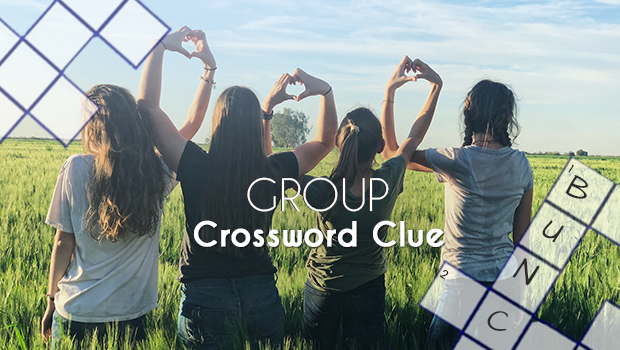Anything from a collection of people to a set of quantum particles

''Group'" is a versatile word that one can use to describe anything from a collection of people to a set of quantum particles. As such, it carries an incredibly wide range of definitions and possibilities. To better understand the nuances of this word, let's take a deeper look at its different meanings and the contexts in which it is best used.
First and foremost, a group is commonly used to refer to a group of people. This meaning was rooted in the past when humans began organizing into communities for protection from predators and other threats. Today, groups can take many forms, from casual gatherings of friends or family for a picnic or camping trip to larger professional organizations like corporations and non-profits. Groups can also include larger collections, such as countries or entire societies. Understanding how different types of groups form, interact, and evolve is important for anyone interested in sociology or psychology.
"Group" can also refer more broadly to any collection or set of things—not just people—that have something in common. A stamp collector's collection could be referred to as their "group" of stamps; similarly, researchers might use the term when referring to a certain genus or species within an ecosystem. In mathematics, group theory involves studying sets with specific properties; this branch of mathematics has applications from chemistry and physics to economics and cryptography.
Finally, "group" might be used more abstractly as well; someone could refer to their "group" of emotions or their "groups" of musical influences when discussing personal growth or inspiration. With all these diverse meanings in mind, one thing remains certain: whatever your definition may be, understanding how groups work will always be important for our society and individual success.
Group, Gathered for Greatness: Common Solutions to the Crossword Puzzle
Some possible solutions to a crossword puzzle question about "group." With these words as clues, you will get the answer. Let's dust off our dictionaries and get solving!
Batch
A batch is an organized set of items gathered together in one unit. It can refer to anything from a group of products manufactured simultaneously or several people or objects gathered together in one large group. In terms of the number of letters, the batch is five letters long.
Bloc
The word bloc refers to an alliance formed by several states seeking common goals, either politically or militarily. Bloc has four letters.
Category
A category is a group or class united by common characteristics or traits. The category has eight letters in total.
Herd
A herd is usually used when referring to animals that travel with each other for food and protection through grazing lands. Herd has four letters—the same as bloc!
Covey
This noun denotes a small flock of birds typically found on their own in open spaces feeding on insects and seeds. Covey has five letters—just like batch!
Tribe
A tribe is normally used when describing indigenous peoples living together within their distinct community and culture. 'Tribe also has five letters—the same as covey and batch!
Clan
Clan refers to a family unit descended from a common ancestor with similar beliefs and customs shared over generations—think Scottish clans such as the Campbell’s or MacLeod’s! Clan has four letters, like herd and bloc.
Team
Team usually describes groups brought together intending to achieve something, like sports or work teams working towards the same target with complementary skillsets. Team has four identical letters too!
Octet
Octet describes any collection composed of eight pieces or members; often seen musically as an octet composed of 8 instruments playing together as one harmonious group. Octet follows suit with all its four-letter glory!
School
A school most commonly refers to where children learn under supervision from teachers or where fish live communally together in aquatic environments (we mean fish here!). School also happens to have six neat little letters altogether!
HUG
Short for "huggermugger," which means chaotic disorder—you know those days where everything seems chaotic? Yup, you guessed it—one can also use it to describe an unorganized assembly or gathering, too - HUG has three neat little characters!
Bunch
Bunch typically means any cluster of multiple individuals grouped - think bunches of grapes from your local grocery store! Bunch follows suit with four memorable characters: U-N-C-H.
Ring
Ring generally denotes any circular formation of members/objects around a center point - think circles/rings made in past ceremonies, such as weddings! Ring, interestingly enough, also belongs in this series - with its remarkable quartet: R-I-N-G.
Bevy
Bevy can refer figuratively and literally to any large bunch/collection. But more specifically to groups of women who go out shopping together (we feel you!) — amazing being that it still fits into this series, too - Bevy holds with its formidable four characters: B-E-V-Y.
Cluster
Cluster usually describes any small grouping/arrangement of items close/together yet distinct — think clusters of stars making up constellations — all coming together yet still separate. Pretty cool, huh? Cluster again fits into this series with its impressive 4 character lineup: C-L-U-S.
Band
Band usually means any strip band encircling something - it could be anything from fashion accessories worn around wrists to jewelry worn around necks. Band again comes back strong here with its 4 character ensemble: B-A-N-D.
Assort
Assort implies any mixture/variety of items — think assortments, chocolates, or ready gift boxes. Assort maintains our streak here, too - yes, you got it - 4 characters: A–S–S–O!
Ensemble
Ensemble denotes any collective performing activity, i.e., music ensembles. Even theatrical ensembles performed stage shows. Ensemble carries us home here, keeping consistency in 4 letters.
There are so many possible meanings for the word group. Consider the word's context, and you'll easily have your answer.
Good luck!
